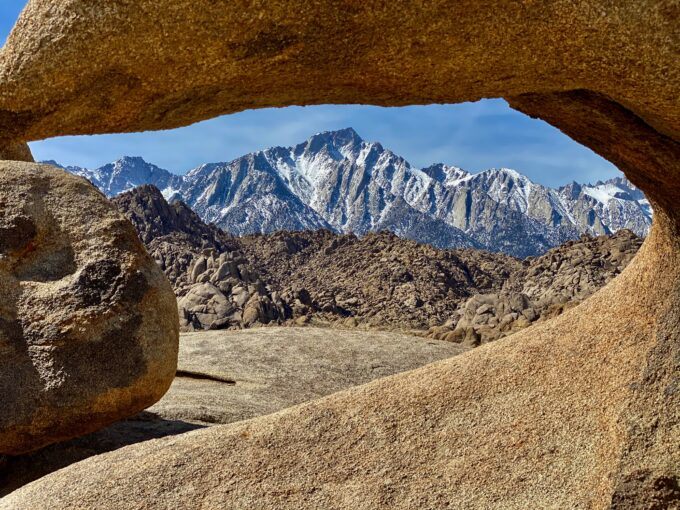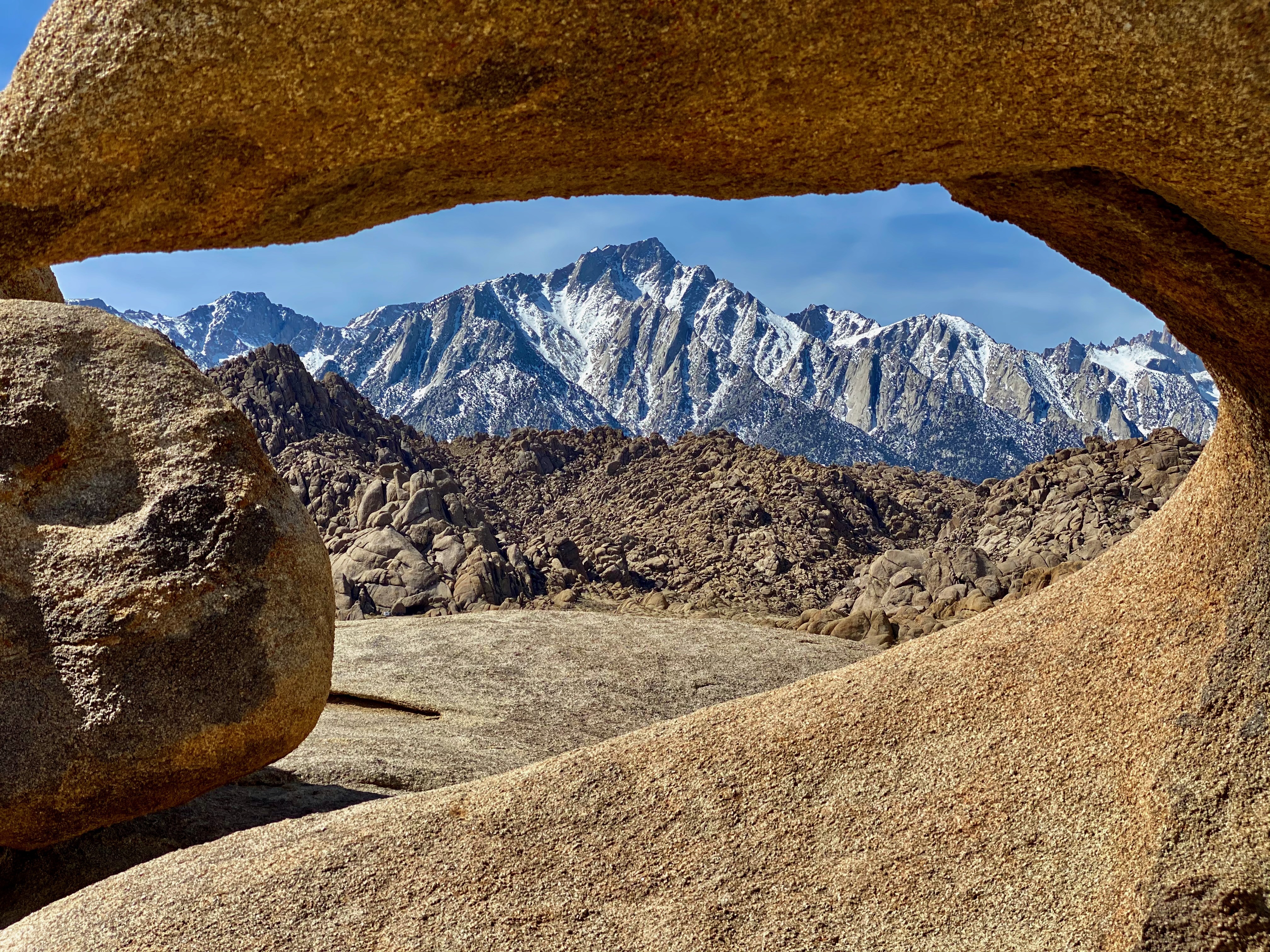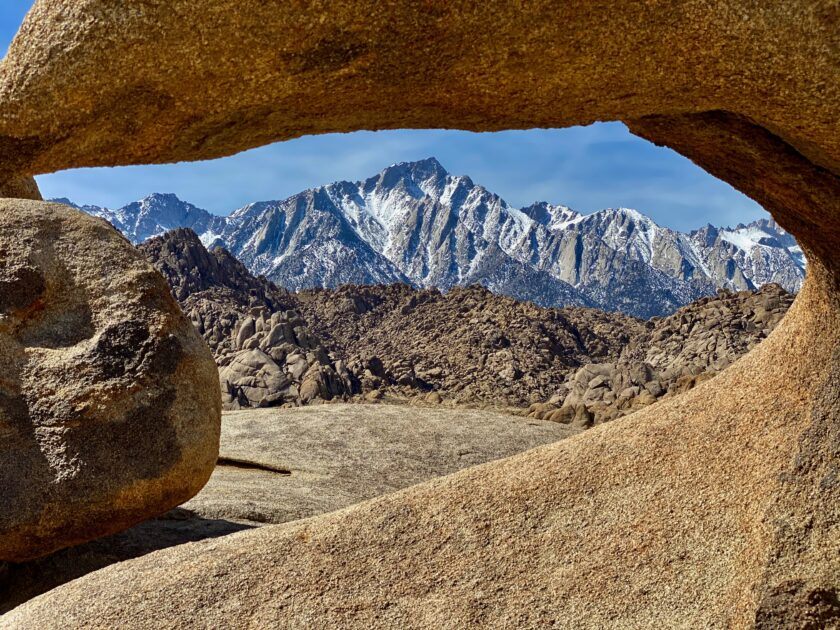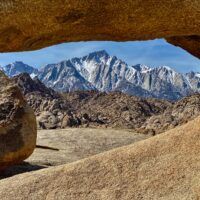






























































Alabama Rocks and Mt. Whitney, BLM lands, California. Photo: Jeffrey St. Clair.
The United States possesses a natural bounty of federal public lands, sprawling across the West and encompassing spectacular mountains, sagebrush basins, and cactus-studded deserts. It is a birthright of all Americans to have access to these lands, but they have long been coveted by commercial exploiters including real estate barons, oil executives, livestock associations, mining corporations. Today, the Trump administration and congressional Republicans are joining forces for the latest land heist targeting the western public domain, and theirs is a multi-pronged offensive.
A Trump Executive Order to create a Sovereign Wealth Fund could be funded by the sell-off of public lands. In the budget reconciliation process, congressional Republicans are considering whether to sell-off public lands around cities and National Parks to pay for tax cuts for the wealthy. In the budgeting process, Congress voted down a bill that would have blocked selling off public lands to prop up the federal budget. There are plans afoot to site artificial-intelligence datacenters on public lands. The State of Utah has chipped in by demanding that all unallocated federal lands in the state – totaling 18.5 million acres – be transferred to state ownership, despite the explicit provision in the Utah Constitution that “they forever disclaim all right and title to the unappropriated public lands lying within the boundaries” of the state.
President Trump is buttressing the land-seizure effort by undermining the federal land management agencies. His administration started by firing “probationary workers,” comprised of new hires and employees who had changed positions within the last year. The administration thought it could get away with firing all of these employees – tens of thousands in number – with a template letter stating they were being released for performance-related reasons (without actually checking their job performances). But unions and nonprofits (including, for full disclosure, Western Watersheds Project) initially turned them back in the courts. But now the injunctions blocking mass-firings have been removed. Meanwhile, Trump is plowing ahead with a new “fork in the road” offering payoffs in exchange for quitting (another round has just been announced), and “Reductions in Force” decisions aimed at eliminating not just the workers but their positions as well. To top it all off, Trump has announced his intention to eliminate entire Departments, such as the Department of Education and the research arm of the Environmental Protection Agency.
Lest this effort be considered unprecedented, it is important to point out that, when it comes to privatizing public lands, this is just the latest in a long line of efforts stretching back to the 1940s with the first “Great Land Grab” spearheaded by western state legislatures. In 1979, the Sagebrush Rebellion was launched, and rancher Wayne Hage tried to use state water rights to control federal public lands. (He failed). In the 1990s, federal workers in Nevada were targeted by bombings. Cliven Bundy, who in 2014 famously staged an armed insurrection to prevent the removal of his illegally trespassing cattle from public lands, sued in state and then federal court to argue that the federal government had no right, under the Treaty of Guadalupe Hidalgo, to own any land outside Washington DC and military bases. (He lost every time).
Trump’s political appointments also follow a pattern of anti-public-lands extremism in right-wing presidential administrations. Ronald Reagan appointed the Mountain States Legal Foundation (MSLF) attorney James Watt. George W. Bush appointed one of Watt’s proteges at MSLF, Gayle Norton, who was once described as “James Watt with a smile.” In his first term, Trump installed as interim BLM Director William Perry Pendley, another MSLF alum who launched failed litigation to overturn the designation of Grand Staircase-Escalante National Monument. Pendley was a Bundy sympathizer who would go on to suggest that federal law enforcement officials let county sheriffs enforce the laws on federal lands, a position aligned with the Constitutional Sheriffs and Peace Officers Association (CSPOA), a Bundy ally group. Trump also appointed Karen Budd-Falen, Cliven Bundy’s former attorney and a favorite presenter at CSPOA events, to be Deputy Solicitor in the Department of Interior. This time around, Budd-Falen has been elevated to be interim Deputy Assistant Secretary of Interior. And the pick to head the Bureau of Land Management? Oil industry lobbyist Kathleen Sgamma. It’s a team built for a frontal assault on western public lands.
From an Indigenous perspective, all these public lands (and private ones as well) are stolen lands, since they were either taken by force or ceded under treaties which the United States government subsequently violated. Nonetheless, in these treaties, many tribes reserved for themselves the right to hunt, fish, and gather in their usual and accustomed places, outside reservation boundaries. Public lands remain some of the easiest and best places for tribal members to exercise these sovereign rights. Thus the seizure of public lands represents a serious threat to America’s Indigenous peoples and their treaty rights.
For all Americans, federal public lands are an irreplaceable birthright, a place to camp, hike, picnic, birdwatch, hunt, fish, and generally enjoy nature. Private lands come with fences, ‘keep out’ signs, and state trespassing laws that prevent public access to private lands. (In Europe, laws increasingly grant some public access to private lands). A trona miner once told me that public lands are “the Wyoming wage,” making up for the small paychecks in that state’s struggling economy.
The land-seizure efforts are drawing outrage from hunters, the outdoor industry, and major public protests in Boise, Helena, Phoenix, Salt Lake City, and elsewhere. But even as millions marched in “Hands Off” protests across America this past weekend, tone-deaf Senate Republicans voted down legislation blocking the sell-off of public lands. As our western public lands are placed once again on the chopping block, we as Americans are called upon to declare what we stand for. Liquidation of wide-open spaces and iconic vistas for the almighty dollar? Or preservation of a legacy of wild places, abundant wildlife, and recreational wonderlands for the generations to come? The fate of western lands will be sealed for everyone, if Americans aren’t willing to fight for them. Let’s get to work.
The post The Biggest Federal Land Heist in the History of the West? appeared first on CounterPunch.org.
This post was originally published on CounterPunch.org.